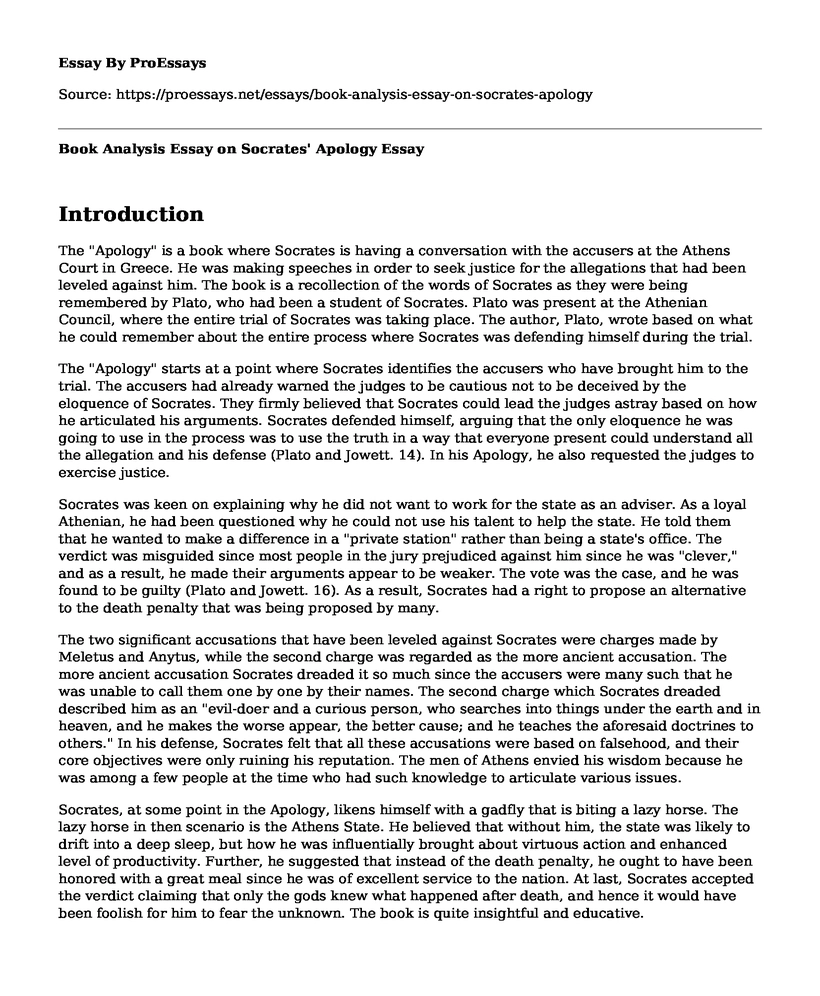Introduction
The "Apology" is a book where Socrates is having a conversation with the accusers at the Athens Court in Greece. He was making speeches in order to seek justice for the allegations that had been leveled against him. The book is a recollection of the words of Socrates as they were being remembered by Plato, who had been a student of Socrates. Plato was present at the Athenian Council, where the entire trial of Socrates was taking place. The author, Plato, wrote based on what he could remember about the entire process where Socrates was defending himself during the trial.
The "Apology" starts at a point where Socrates identifies the accusers who have brought him to the trial. The accusers had already warned the judges to be cautious not to be deceived by the eloquence of Socrates. They firmly believed that Socrates could lead the judges astray based on how he articulated his arguments. Socrates defended himself, arguing that the only eloquence he was going to use in the process was to use the truth in a way that everyone present could understand all the allegation and his defense (Plato and Jowett. 14). In his Apology, he also requested the judges to exercise justice.
Socrates was keen on explaining why he did not want to work for the state as an adviser. As a loyal Athenian, he had been questioned why he could not use his talent to help the state. He told them that he wanted to make a difference in a "private station" rather than being a state's office. The verdict was misguided since most people in the jury prejudiced against him since he was "clever," and as a result, he made their arguments appear to be weaker. The vote was the case, and he was found to be guilty (Plato and Jowett. 16). As a result, Socrates had a right to propose an alternative to the death penalty that was being proposed by many.
The two significant accusations that have been leveled against Socrates were charges made by Meletus and Anytus, while the second charge was regarded as the more ancient accusation. The more ancient accusation Socrates dreaded it so much since the accusers were many such that he was unable to call them one by one by their names. The second charge which Socrates dreaded described him as an "evil-doer and a curious person, who searches into things under the earth and in heaven, and he makes the worse appear, the better cause; and he teaches the aforesaid doctrines to others." In his defense, Socrates felt that all these accusations were based on falsehood, and their core objectives were only ruining his reputation. The men of Athens envied his wisdom because he was among a few people at the time who had such knowledge to articulate various issues.
Socrates, at some point in the Apology, likens himself with a gadfly that is biting a lazy horse. The lazy horse in then scenario is the Athens State. He believed that without him, the state was likely to drift into a deep sleep, but how he was influentially brought about virtuous action and enhanced level of productivity. Further, he suggested that instead of the death penalty, he ought to have been honored with a great meal since he was of excellent service to the nation. At last, Socrates accepted the verdict claiming that only the gods knew what happened after death, and hence it would have been foolish for him to fear the unknown. The book is quite insightful and educative.
Works Cited
Plato and Benjamin Jowett. Apology. Portland, OR: Floating Press, 2011. Internet resource.
Cite this page
Book Analysis Essay on Socrates' Apology. (2023, May 01). Retrieved from https://proessays.net/essays/book-analysis-essay-on-socrates-apology
If you are the original author of this essay and no longer wish to have it published on the ProEssays website, please click below to request its removal:
- World of Crime in Great Expectations Essay
- The Relationship Between Ethics and Criminal Justice Administration
- Ethical Concerns Affect the Role of Business in Society Essay Example
- Critical Analysis of "Death Be Not Proud" Essay Example
- Essay Example on Neverhome: Exploring Power Through Dispositional Characteristics
- Essay Example on Sonnet XX: A Young Man's Dual Nature and Character
- Ethical Egoism: Right vs. Consequences for Others - Essay Sample







